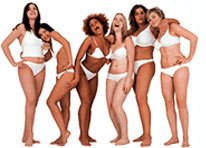Another
article about the changing dress standards.
What’s provocative?
Professional women walk a fashion tightrope
So which is it? Can sex appeal be part of a woman’s professional wardrobe? Should it be? Does she have a choice, if she’s under 40 and wants to look remotely in style?
The year 1977, it seems, was a simpler time. “Wardrobe engineer” John T. Molloy, author of the best-selling “Dress for Success” books, used a presidential campaign’s worth of focus groups to come up with a uniform for the new wave of women entering the traditionally male-dominated management ranks. Stick with a dark, knee-length skirted suit, a contrasting blouse, minimal make-up and basic pumps, he advised. No sweaters: “Sweaters in the office spell secretary. … They say lower middle class and loser.” Anything but skin-colored hose was “unthinkable” in the workplace. And furthermore, Molloy advised — apparently missing the irony of a statement like this in a book urging women to neuter their femininity at the office — anything but skin-colored hose would turn men off.
Oddly, even tailored pantsuits weren’t acceptable. Even as women were supposed to be dressing to de-emphasize their womanliness, according to Molloy, they needed to wear clothing that revealed their legs for their colleagues’ pleasure and/or judgment.
Molloy set up, or at least reflected, a tightrope that women still navigate today — and as business casual has become the norm in a lot of workplaces, not to mention as fashions have grown progressively revealing, the tightrope’s gotten thinner and thinner. We’re not supposed to dress like men, but if our clothing emphasizes our femaleness too much — if we show too much leg or too much cleavage or too much curve — we may cause men’s eyes to light up, but, research has demonstrated, we won’t cause their brains to take us seriously. Not to mention the even harsher judgment women can bring down on other women they believe have crossed the invisible line.
And now what this article isn’t about. It’s not trying to pin down where that line is, or taking a moral stand on women who use provocative dress to make a sale or get a bigger tip or even just get attention. Sex, or in this case just the suggestion of it, sells because people are willing to buy it; if those people are so easily separated from their money, well, who’s to tell a woman acting of her own free will that she’s immoral for taking advantage?
But we all do, of course, and that’s why there is a line. The problem today is that it’s very difficult sometimes to know where the line is. It changes depending on industry, company culture, age, season, and current fashion.
There’s the line, for instance, that Shannon Wynne draws. Wynne owns the Flying Saucer, a chain of pubs with a location in the River Market district. The Flying Saucer is known for two things: the beer selection, which is huge, and the waitresses’ uniforms, which are not. They consist of a tight tank top or T-shirt, a (sometimes extremely) short plaid skirt or skort and knee socks. But Wynne differentiates between the Flying Saucer and Hooters because, he said, the girls he hires choose the length of their skirts and the tightness of their shirts, and none of the bar’s ads and promotions make even veiled references to female anatomy.
“We’re not a breastaurant,” he said. But Wynne has frank discussions with his waitresses about their uniforms and their bodies.
“Let them show cleavage — they can use it to make money,” he said. “Why dodge the subject? That’s exactly what it does. But by no means is it required.”
Wynne said the extra exposed skin can mean a 20 percent jump in tips for a girl who’s got the figure, but that she’s got to have the personality to go with it. “It’s not only wearing the low-cut T-shirt,” he said. “It’s how you handle people’s egos.”
Elsewhere on President Clinton Avenue, Suzon Awbrey — a former bartender herself, now co-owner of Sticky Fingerz Rock ’n’ Roll Chicken Shack and Rumba/Revolution — provides uniform T-shirts and tank tops for her restaurants’ wait staff, but lets them dress themselves from the waist down. The upside is, all body types can be comfortable; the downside is that waitresses occasionally push the limits of what Awbrey considers appropriate, even in a club environment.
“I have had to step in and draw the line a time or two,” she said. “… I don’t need to see your hiney cheek when you bend over. Legs are great, hineys not so much.”
The lines get grayer, and the penalties for crossing them greater, as the relative status of the occupation increases.
Peter Glick, a professor of psychology at Lawrence University in Wisconsin, published earlier this year a study of how people perceived women according to their dress and occupation. Participants watched videos of a woman reading from the same script, but dressed differently – either conservatively or provocatively (short skirt, lots of cleavage, heavy make-up, tousled hair, etc.). When the participants were told the woman was a receptionist, Glick said, their perceptions of her didn’t change based on what she was wearing. But when they were told she was in management, they reacted much more negatively to the provocative dress.
“They saw her as less competent,” Glick said. “They had an emotional reaction that seemed to drive that perception.”
So why did the receptionist get away with it when the manager didn’t? Sexuality is associated with traditionally feminine occupations — the stereotype of the stewardess, the receptionist, the nurse.
“We thought women wouldn’t be penalized [in those professions] because they were not combining sexiness with power,” Glick said. “But it would be different in a high-status profession.”
Another study, released last year by a professor at Tulane University, concluded that women in high-status professions do pay a concrete price for bringing sexuality in the workplace. The survey asked women with MBA degrees whether they’d ever used one of 10 “sexual behaviors” — dressing provocatively was one; others included sending flirtatious e-mails or giving back-rubs — at the office. About half said they had, and those women made less money and had gotten fewer promotions than the women who said they hadn’t.
But defining what’s provocative is a thorny business. Even knee-length skirts show a woman’s calves, and most tailored garments will follow her figure. What about heels? Lipstick? Both are part of most women’s idea of dressy attire, but both were created with no other purpose than to make women look more attractive to men.
Every woman interviewed for this article had a different standard for what she considered appropriate in the workplace. Brenda Scisson, director of public relations for Stone Ward and a veteran of both the advertising and banking industries, has a no-cleavage rule for herself, although she doesn’t apply it to some of the younger women in her office who don’t have day-to-day contact with outside clients, as she does.
Carole Smith, a former owner of New Traditions, a women’s clothing store, as well as a former banker and current president of a management and human resources consulting firm, is OK with slightly lower necklines, depending on a woman’s bust size.
“I wear some stuff that’s pretty low,” she said. “I don’t mind if you show a little rise right there, but not cleavage.”
In another industry, though, she readily admits her standards would be different.
“Let’s take pharmaceutical sales, for example,” she said. “We all know part of success is being able to get in the door and see the doctor. That means you need to be very attractive and very feminine, I think.
“But you still need to be respected for what you know about the product. I don’t think you can walk in with your boobs hanging out, but an outfit that shows your figure, maybe a shorter skirt, I think it’s great.”
Both Scisson and Smith, who are in their 50s, said younger women seem to have more difficulty knowing what’s appropriate in the workplace and what isn’t.
Part of that is what younger women see when they shop in stores geared at their age group. Finding a summer top with thicker than spaghetti straps isn’t easy; finding one with sleeves is virtually impossible. This season’s most promoted item at the Limited, a popular mall chain, is “the Sexy Summer Suit” — tight-fitting, and available with long, cropped or knee-length pants.
It can be even worse for women just a few years older, who’ve moved beyond entry-level jobs but aren’t ready for matronly styles.
“Thirty to 40 is land-mine city,” said Kerri Jackson Case, 30, a former TV news reporter and pharmaceutical sales rep who now works in public relations. “You’re in this horrible place between being old and being young, and you can’t be either. … I don’t know what you’re supposed to wear. No one does.”
As for her own ideas of what’s appropriate, “I don’t have any hard and fast rules,” she said. “I can’t tell you exactly where the line is, but I can tell you if it’s been crossed.”
(Case herself, on the day we spoke, wore a short-sleeved jacket over one of the deep-V, crossover-bodice tops that are extremely popular right now, but have the potential to bare a fair amount of cleavage. “I guess I have quite a few tops that look like this,” she said.)
Younger women also tend to watch a lot of TV, where shows feature more and more women in important positions — invariably dressed in something tight or short or low-cut.
“You watch any kind of show set in the workplace, and most of the time women are wearing something inappropriate,” said Amanda Tiner, 29, an interior designer.
“We see more and more of these images of women in the workplace,” said Glick, the psychology professor. “There’s a sexualizing of women in the workplace going on that’s problematic. There’s kind of a trap here.”
The trap, he said, is that dressing sexy, as popular culture says it’s OK to do, can actually help a young woman get hired into an entry-level job. But it can also keep her from moving up.
And it’s not just because of how men view her. Other women’s reactions can be just as damaging.
“Women judge other women,” Tiner said. “They almost look down on women they think dress inappropriately. They think, ‘She doesn’t do as good a job.’ ”
Case agreed.
“I think it depends on if you’re the kind of woman who would do that,” she said, referring to women who dress provocatively to get some benefit at work. “If you’d do it, you probably don’t mind. But if you’ve made the decision not to do that, it tends to get very catty.”
Kristen Dickens, a wardrobe consultant and personal shopper in Little Rock, helps women develop or tweak their own styles.
“For a lot of people, especially in their professional wardrobe … usually what they’re looking for is something to add sex appeal,” she said. And in recent years, she said, they’ve had more options to do so tastefully.
Companies have a hard time pinning down exactly what’s appropriate, she believes, in part because fashion changes so quickly — and along with it, people’s ideas of what’s acceptable. Ally McBeal’s circa 1998 upper-mid-thigh hemlines, for instance, look extremely dated today, at least where business suits are concerned. Around the office, knee-length is the norm. For now, anyway.
And then, of course, there’s the whole issue of the double standard. The most pressing fashion question men have to ask themselves is whether or not to wear a tie. Business casual, for men, can actually be defined in 50 words or less.
But this is a self-inflicted wound. We could trade in our freedom for a pants-and-button-down uniform — author John Molloy begged us to back in 1977 — but on a 95-degree day it seems worth the hassle to be able to ditch long pants in favor of capris or a skirt sans pantyhose.
“It has so much to do with a woman’s psyche, her comfort level,” Dickens said. “Part of her comfort level comes from sex appeal. Whatever part of your body you feel comfortable with, you will show it off or flatter it somehow.”











